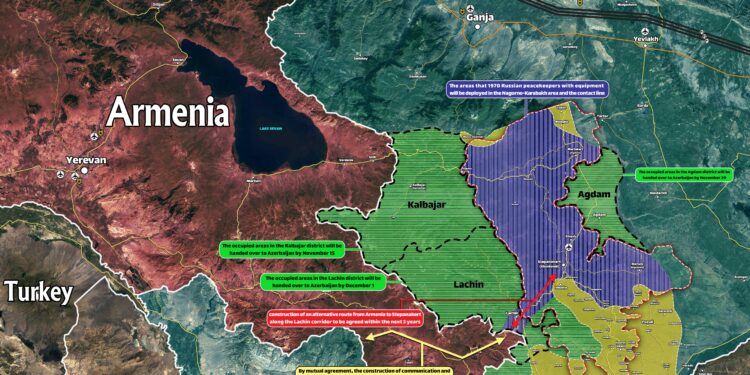The recent Armenia-Azerbaijan agreement has captured international attention as a potential turning point in the long-standing conflict between the two nations. In a detailed assessment published by the Hudson Institute, experts analyze the terms, implications, and future prospects of this landmark accord. This article delves into the key findings of the Hudson Institute’s report, exploring how the agreement could reshape regional dynamics, influence geopolitical alliances, and impact the lives of millions in the South Caucasus.
Background Context and Key Provisions of the Armenia-Azerbaijan Agreement
The recent agreement between Armenia and Azerbaijan marks a critical juncture in a conflict that has spanned decades, rooted deeply in territorial disputes over Nagorno-Karabakh. After the devastating 2020 war, international stakeholders pressed for a framework aimed at stabilizing the region, preventing further warfare, and addressing humanitarian crises. Central to the agreement is the mutual commitment to cease hostilities and engage in constructive dialogue, underscoring a significant shift from previous entrenched positions. The accord also highlights mechanisms for border delimitation and confidence-building measures, signaling an intent to normalize relations through pragmatic steps despite ongoing complexities.
Key provisions outlined in the document include:
- Demarcation of the international border with joint verification
- Guaranteed safety and rights for displaced persons and ethnic minorities
- Reopening of transport corridors to facilitate trade and communication
- Establishment of joint commissions to address economic, cultural, and security cooperation
- A bilateral framework for handling landmine clearance and military de-escalation
| Provision | Purpose | Expected Outcome |
|---|---|---|
| Border Demarcation | Define clear territorial lines | Reduce border skirmishes |
| Minority Rights | Protect ethnic communities in border areas | Enhance social stability |
| Transport Corridors | Enable uninterrupted regional trade | Boost economic interdependence |
Evaluating the Impact on Regional Stability and Security Dynamics
The recent accord between Armenia and Azerbaijan signifies a critical juncture in South Caucasus geopolitics, carrying profound implications for the broader regional security architecture. By formalizing terms that address territorial disputes and establishing frameworks for confidence-building measures, the agreement has the potential to ease longstanding tensions. However, the durability of peace depends heavily on effective implementation and sustained political will from both capitals, as well as the roles played by external powers such as Russia, Turkey, and the European Union.
Key factors shaping the security dynamics include:
- Demilitarization of conflict zones: Reducing active military presence to prevent accidental escalations.
- Joint monitoring mechanisms: Establishing neutral observation bodies to oversee ceasefire adherence.
- Energy corridor stability: Ensuring secure transportation routes that connect regional energy markets.
- Humanitarian access and reconciliation: Facilitating return of displaced populations and fostering community dialogue.
| Dimension | Potential Impact | Challenges | |||||||||||||
|---|---|---|---|---|---|---|---|---|---|---|---|---|---|---|---|
| Military Stability | Decreased border skirmishes | Entrenched mistrust between forces | |||||||||||||
| Political Dialogue | Enhanced diplomatic engagement | Nationalist opposition within both societies | |||||||||||||
| Strategic Recommendations for Sustainable Peace and Economic Cooperation To foster a durable resolution between Armenia and Azerbaijan, prioritizing mutual trust-building measures is essential. Both nations should engage in transparent dialogue mechanisms that include civil society representatives, aiming to reduce misinformation and politicized narratives. Establishing joint committees on security and humanitarian concerns can serve as platforms for ongoing engagement. Furthermore, implementing confidence-building initiatives, such as cross-border cultural exchanges and cooperative infrastructure projects, will create tangible benefits that underscore the value of peace over conflict. Economic collaboration offers another critical pathway toward sustainability. Strategic investments in shared transportation corridors, energy networks, and trade zones could significantly uplift regional prosperity. Below is a concise overview of potential economic cooperation areas:
Ultimately, a multi-layered approach combining security, economic, and cultural efforts-backed by sustained international support-can help transform a fragile ceasefire into a lasting peace, benefiting not only Armenia and Azerbaijan but the wider South Caucasus region. Concluding RemarksThe Armenia-Azerbaijan agreement marks a pivotal development in a conflict that has shaped regional dynamics for decades. While the terms signal a significant step toward peace, many challenges remain in implementing the accord and addressing underlying tensions. As both nations navigate this fragile path forward, continued attention from the international community will be essential to ensure lasting stability in the South Caucasus. The Hudson Institute’s assessment underscores the complexities ahead, highlighting that the road to reconciliation is as critical as the agreement itself. ADVERTISEMENT |
















